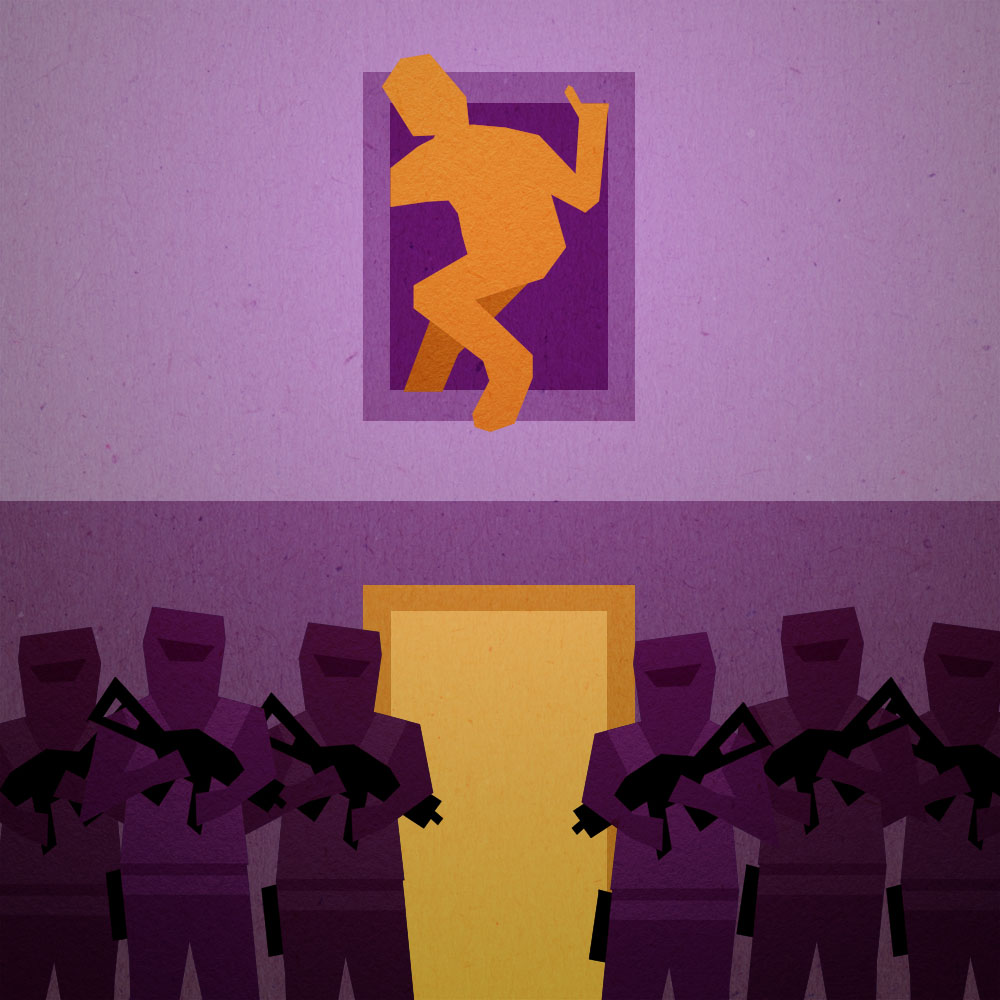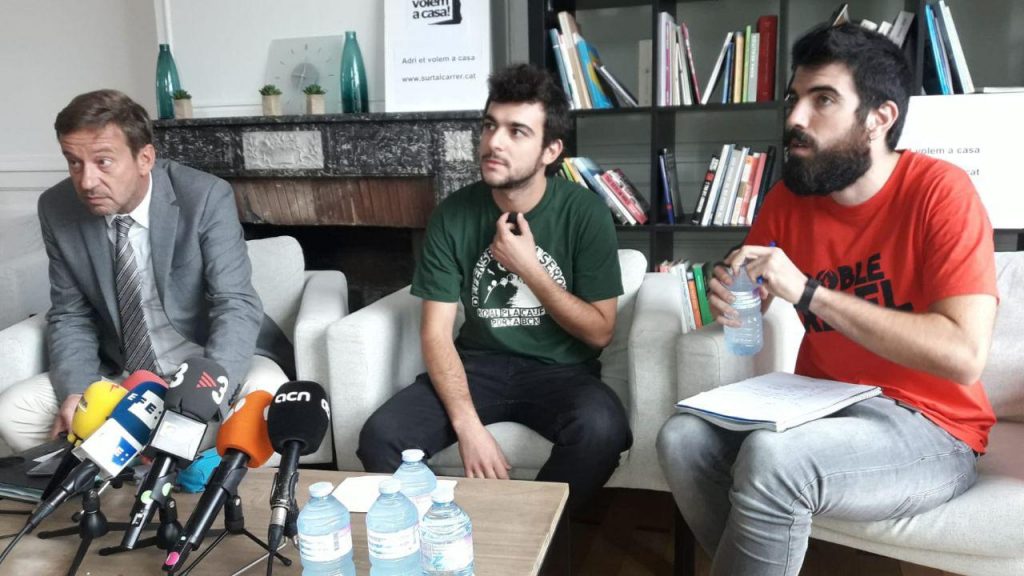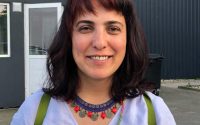Spain // Interview with Adrià Carrasco, Catalan independentist in political exile~ 9 min

Note: Guilhotina does not have a position on Catalan independence but, even for those against it, this interview is an important portrayal of repression in the Spanish State.
Por Guilhotina.info
Adrià Carrasco is one of the eight Catalan independentists in exile for political reasons. Unlike the others, he wasn’t a member of the government, parliament, or any political party. It is a case of a grassroots militant, as many others, that took part in the Republic Defense Committees (CDR), an almost spontaneous, decentralized and horizontal organization that rose up to defend voting centers during the referendum of self-determination in Catalonia which occurred on October 1st of the present year. After the voting process, their role has been to call for the implementation of the result and offer support to the various anti-repression causes that derived from the struggle. Another case, such as that of rapper Valtonyc – also in exile – of repression against those that challenge the system. In Catalonia, the platform Adri et Volem a Casa gives him support. Carrasco answers Guilhotina’s questions from Brussels, where he is now residing.

Who was Adrià Carrasco before exile?
He was a 26 year old person with quite a common life. I had a stable job and was looking for a flat to become independent. I was organized with the Plataforma No al Pla Caufec-Porta BCN and also in the CDR of my city, Esplugues de Llobregat, since October 1st of 2017. The current social and political situation unsettled me a lot and I wasn’t comfortable with standing still with my arms crossed.
Pla Caufec?
It is a city plan that started in the beginning of the 90’s and which has received much opposition by neighbours and ecological and social collectives. It intends to build 8 story high luxury buildings in the outskirts of Collserola, the only natural park we still have in Barcelona. A shopping mall will also be inaugurated, the biggest one in town, which threatens to end local commerce as well as ruining circulation in the area. The city hall has always been an accomplice of this speculation and has facilitated it to private interests in disregard of the interests of the people. It is not only an ecological concern, but also about how we envision our towns and cities: in favour of capital or in favour of the citizens and their commerce. We, the No al Pla Caufec-Porta BCN Platform, are a set of neighbours that united to do actions against it and to explain to the people of the town that they’re at [private interests] caprice.
Why are you in exile?
Because I’ve decided not to submit myself to Spanish justice and to a court that descends directly from the courts of the Franco dictatorship and whose actions, sentences, and way of operating continue to be fascist, in addition to being politically motivated.
What are the CDR?
The CDR are organizations which were created before October 1st, with the objective of guaranteeing that the Catalan people could exercise their right to vote during the Self-Determination Referendum of Catalonia, in the face of the threats, censorship and violence exercised by the Spanish State to stop such a referendum from happening. Afterwards, and with a clear result in favour of the YES to independence, the CDR decided to change the R from Referendum to Republic, defending that the voting was legitimate and its mandate should be obeyed. The CDR are independent in each town, they obey the decisions of each assembly and don’t need leaders.
What did you do there [at the CDR]?
I didn’t have any role, I simply went to the mobilizations and actions that the CDR called. I participated in different mobilizations, debates, plays, concerts, road blocks, etc. The action for which I am under accusation consisted of opening the barriers of toll road so that the people could circulate without having to pay. The objective was to protest against the mistreatment imposed by the Spanish State, and claim that these highways were already paid for and that we didn’t have to keep paying to a company to whom [the accumulation of] capital is the sole motivation, while at the same time we showed how we wanted the Republic to be: with freedom of movement for everybody and without economic lobbies that rule our lives.
At what moment did you decide to leave? How did you manage to escape from the Spanish Civil Guard (Guardia Civil/GC)?
In the morning of April 10, 2018, I was sleeping in my bed when they knocked at the door insistently. I got up and saw that the GC were there in the entrance of my home. Normally, when they come for you, they send you a citation to testify. I knew that if 15 guys came to my house with machine guns, the accusation would probably be for terrorism. In that moment it wasn’t exactly a decision, but instinct. I got dressed with the first clothes I could find and I left through the balcony. The 30 seconds that my mother delayed opening the door were what allowed me to escape.
The fact that it was an instinct doesn’t imply it wasn’t premeditated. I had it very clear: if they came after me, I had no intention of submitting myself to their fascist judicial system, and even less of being screwed over.
What is you current judicial situation?
The initial accusations were of terrorism, rebellion, and sedition. Some time ago, more than a week, we found out that the National Court decided to abstain from [prosecuting] the case and relocated it to an ordinary court, in this case, Barcelona’s court. Which means that these initial accusations, since they’re not being investigated by the National Court, are currently dismissed and that the court of Barcelona will investigate a few supposed public disorders.
What does this mean? They have no proof with which to accuse me of terrorism. That day, with the disproportional police apparatus, was pure theatre, a police set-up obeying a political strategy with a very clear objective: to spread fear in the people that struggle and give a public example, to try and erase the independentism that takes to the streets. But it didn’t go as they planned…
Are there more people in a situation similar to yours?
Yes. The day they came to get me they also went for a comrade of the Viladecans CDR: Tamarra Carrasco. She wasn’t as lucky as me and since that day that she is imprisoned in her own town. The provisional measures imposed by the judge prohibit her from leaving Viladecans and compel her to present herself at the police station every week. It’s an aberration.
Part of the Carles Puigdemont government team is also in Belgium, him as well. The rapper Valtonyc also had to go into exile, for singing against the monarchy. It’s a sham.
Are you still an active militant now that you’re distant?
I do what I can but it is pretty frustrating for a person like me, that is used to struggle in the streets.
What do you consider your role to be now?
Now my role is focused on denouncing and explaining what is happening in Spain. That a 26 year old kid can be accused of terrorism for such actions is a scandal and shows what kind of rotten justice we have in Spain. The fact that I am far away bothers them because I am yet more proof that something is failing in Spain (in fact, I’m the only exiled civilian).
How is it to share exile with the institutional leaders of independentism?
To have people here that are in a similar situation to yours helps a lot. It creates a network and makes you feel less lonely.
Don’t you feel a contradiction in being active on the same political cause as the right?
There are people of all ideologies in the CDR, it is a practice we brought from back home. In front of us lays an old but strong monster, and we must have it clear that the only option we have to win against it is by uniting efforts. Beyond that, I see it as way to give an opportunity to the close-minded to become aware that the “extreme left-wing radicals” are nothing more than regular people who have a clear vision of who is the enemy and that we have to fight him with full force. It is an opportunity to “convince” the more conservative sectors that our objective is to defend an end to inequalities, discriminations, and the economic privileges of the elites towards the goal, if you allow me the simplicity, of building a fairer world.
What sense does it make for the left to join a nationalist pretension?
We’re acting as if there are no leftist patriots. And it is not like that, there are, many of them.
There’s another sector (in which I include myself) that sees independence as a tool, an opportunity to break with the ‘78 regime and begin again. For me, that is the purpose of independence, and I believe that each and every day more and more people share it. If we have to create another state that is equally repressive, capitalist, and unequal as the one we have now, for me, it makes no sense.
The CDR talk a lot about disobedience. What does this word represent to you? Do you believe that this is the way to go for independentism? Why?
It represents not submitting to the power which law enforcement exercises over the people. It means jumping from the balcony when they come to get you.
I believe it is the only option: the Spanish State won’t give us anything for free, we must take it with our own hands.
Referring to this, how do you analyze the politics that the current Government of the Generalitat and the independentist parties are pursuing?
In the parties there is the risk that a deputy may want to maintain his parliamentary seat at any cost, and that is what is happening in Catalonia. If anybody thinks that we can separate ourselves from Spain without sacrifices, they are wrong. But the “passivity of the government” makes people think that not even they know how to do it, and that is good. Because the deduction that follows is that if they don’t do it, we the people must do it. And it must be done in an organized mass movement, with non-symbolic objectives.
What can organized movements in the rest of Europe, and in Portugal in particular, do to give support to your anti-repression cause?
Diffusion, solidarity, talks with their people… or something more ambitious, to force certain political parties to publicly pronounce themselves against injustices in Spain.




